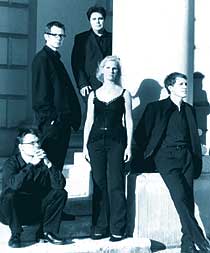"I can understand why people play
Mozart and Schubert – it’s great music and people enjoy it –
but I think people enjoy hearing something different," says
Thomas Kemp, artistic director of Chamber Domaine.
The chamber music group will make its American debut at Bargemusic
July 31 through Aug. 3. The residency is, indeed, ’something
different’: four concerts of British music that include living
composers and works by Sir Edward Elgar (1857-1934).
Kemp formed Chamber Domaine five years ago in London. "I
always had an idea of a chamber ensemble doing a very eclectic
repertoire to introduce the public to contemporary works, 20th
century works and classic works," he says.
"This is excellent music, and I always program works that
go well together so you can hear the relationships between different
pieces and their composers," says Kemp. "The way forward
for contemporary music is to be heard alongside more traditional
pieces – to be put in their proper context. And Bargemusic –
which wanted ’something different’ in their programming – is
the perfect place to introduce this program."
Kemp has yet to visit the floating East River barge, but advance
word has made him anxious to play here.
"Bargemusic is by all accounts the best place anywhere to
play chamber music because of its size and location," he
says.
The recitals follow the same structure: an Elgar chamber work,
two works by Elgar contemporaries (William Walton, Arthur Bliss,
Frank Bridge and Benjamin Britten), and two by current composers
(Judith Bingham, Judith Weir, Thomas Ades and Stuart MacRae).
"A lot of British music isn’t performed that much outside
England, especially in the States," Kemp says. "So
it seemed like a good idea to program this very interesting chamber
music."
Best known hereabouts for his ubiquitous "Pomp and Circumstance"
march performed at graduations every June, Elgar epitomizes stuffy
olde England for many.
"Elgar represents a kind of musical romanticism, like Brahms,"
Kemp notes, "but Elgar’s chamber music, the last music he
wrote before ’retiring’ to conduct, is really something special."
His compositions anchor the Chamber Domaine programs. On July
31, the Violin Sonata in A sits alongside Walton’s Piano Quartet,
"A Song for the Lord Mayor’s Table," and Bingham’s
vocal works, "The Moon over Westminster Cathedral"
and "My Father’s Arms."
On Aug. 1, Elgar’s String Quartet ends a program that includes
Weir’s "Bagpiper’s String Trio" and Piano Quartet,
and Bliss’ "Three Romantic Songs" and Piano Quartet.
Elgar’s "Seven Lieder" for Soprano and Piano are heard
Aug. 2, along with Bridge’s Three Songs and "Phantasie"
for Piano Quartet, and Ades’ "Life Story" and "Arcadiana."
Finally, the Aug. 3 program presents both Elgar’s and MacRae’s
Piano Quintets, MacRae’s "One Man and His Time" and
Britten’s "Lachrymae" and Three Divertimenti for String
Quartet.
"Elgar represents the end of an era; the others represent
a new freshness," Kemp explains. "A lot of these composers
have ties to America: Bridge, Bliss and Britten had music commissioned
by Elizabeth Sprague Coolidge (who also commissioned works by
Ravel, Schoenberg, Copland, Stravinsky and Bartok). Bliss’ father
and wife – who is still alive at age 99 and lives in London –
were American."
The Bliss Piano Quartet, a U.S. premiere, which Chamber Domaine
has recorded on the ASV label, had a peculiar genesis, according
to Kemp: "It was written in 1915, when [Bliss] was fighting
in the trenches. After World War I, he changed his style to something
very modern and suppressed his earlier works."
For Kemp, the programs’ living composers are, as he calls them,
"a snapshot of contemporary British music. Ades’ ’Arcadiana’
has bits of Elgar in it, and the movements are aquatic in theme,
so I thought it would be appropriate to play on the barge. His
’Life Story’ is a bit like Billie Holiday, so it links to the
jazz scene.
"MacRae is a young Scottish composer with many commissions.
His music is quite progressive and sounds avant-garde,"
he continues. "And Weir and Bingham are Britain’s most eminent
female composers.
"Weir’s quartet was composed in America, I think, and sounds
like Copland. And her ’Bagpiper’s Trio’ was inspired by the true
story of a soldier who was hanged for possessing bagpipes. Bingham’s
pieces are beautiful, especially her short piano piece [and world-premiere
performance], ’The Moon over Westminster Cathedral.’ ’My Father’s
Arms’ is quite topical because it’s about children in various
kinds of conflict. It’s a very moving piece."
Kemp – whose own career included performing with the English
Chamber Orchestra and the London Sinfonietta – is happy to program
whatever he wants.
"We often put lieder into a program of chamber music,"
he says, "which is unusual, but often you find that the
songs illuminate chamber music by the same composer."
Case in point: three of the Bargemusic recitals include vocal
and instrumental music. And there’s more where that came from,
says Kemp: "There’s a lot of neglected music from the 20th
century repertoire that we’d like to do."
Perhaps during their next Brooklyn visit?
Chamber Domaine performs British chamber
music at Bargemusic July 31-Aug. 3; Thursday, Friday and Saturday
at 7:30 pm and Sunday at 4 pm. Bargemusic is located on Fulton
Ferry Landing in Brooklyn Heights. Tickets are $35, $20 for full-time
students and $25 for seniors (Thursday performances only). For
more information, call (718) 624-2083 or visit www.bargemusic.org.

























